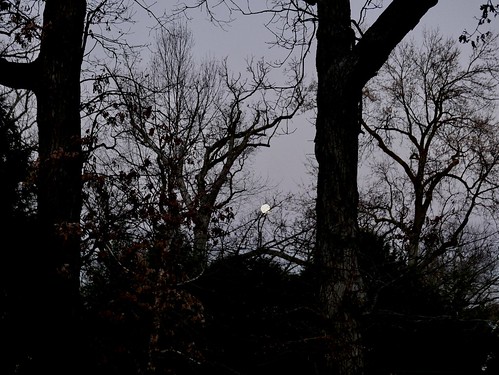
Seen just now from the window next to my desk.
From the Farmer's Almanac:
In Native American cultures which tracked the calendar by the Moons, December’s full Moon was known as the Full Cold Moon. It is fittingly associated with the month when the winter cold fastens its grip and the nights become long and dark. This full Moon is also called the Long Nights Moon by some Native American tribes because it occurs near the winter solstice—the day with the least amount of daylight. This year, the Full Cold Moon reaches its peak just a day after the winter solstice, meaning it will appear full to the naked eye on the night of solstice. The last time the full Moon occurred exactly on the winter solstice was in 2010, but it won’t happen again until 2094!...




17 comments:
In Native American cultures which tracked the calendar by the Moons, December’s full Moon was known as the Full Cold Moon. It is fittingly associated with the month when the winter cold fastens its grip and the nights become long and dark.
So they knew it was the cold time of year, with long dark nights, because of the Moon. Gotcha!
"No North American Indian tribe had a true calendar--a single integrated system of denoting days and longer periods of time."
But some did counts moons.
The important thing about the full moon is that you don't need a flashlight to see if your dog has done her business at night.
Sometimes sniffing takes priority and the job is not yet done.
The Full Cold Moon was a killer yesterday. 222 dead in Indonesia after a volcanic eruption and a tsunami made worse by the high tides.
Various Amerindian Tribes names for December Moon = winter maker moon, small spirits moon, geese shedding their feathers, center moon's younger brother, nut moon, when the wolves run together, fall moon, moon when the young fellow spreads the brush, big winter, ripe berries, moon of respect, moving inside for winter, moon when the wind shakes off leaves, time of much ripening, frost fish moon, strawberry moon, winter, when deer shed their horns, unborn seals are getting hair, big bear's moon, her winter houses moon, sun has traveled home to rest.
Some tribes don't have a "December" and there are a couple of "cold moons", which go with January, not December.
You can tell the Almanac is pulling your leg because they treat all "Native American cultures" as one entity. Fake News!
"The Full Cold Moon was a killer yesterday. 222 dead in Indonesia after a volcanic eruption and a tsunami made worse by the high tides."
I had just noticed that (and was putting up a new post on that subject).
OK. I was in a guitar shop and was talking to a guy about fixing my 40 year old guitar, which is not objectively worth the cost, but it has a lot of sentimental value to me. Anyway, an hour later I get an ad from an outfit that buys and sells vintage guitars. I thought i had turned off all of the apps that had microphone access but I guess it still spies on me. I think I will get an Apple phone or a flip phone.
Reflections of a full cold moon
That 76 year gap is a surprisingly large variance.
I am sure there is a murder mystery title “Cold Moon” somewhere, Haven’t read the gaunre for many moons.
el yeti viene!
orale!
ok, aqui, nos vamos, El Yeti Viene!
el yeti loco de la verdad, si monde
Total lunar eclipse next full moon.
Yes, and the lunar eclipse will be visible throughout North America, and is particularly convenient since it starts around 9:30 p.m. in the eastern time zone and reaches totality before midnight, so you don't have to get up in the middle of the night to see it.
The coming lunar eclipse is Lunar Saros 134. The first lunar eclipse I ever watched was from the same Saros series 36 years ago this month. That one, where I lived, wasn't total, and I remember it well because of how disappointed I was that I couldn't even tell a difference.
For both solar and lunar eclipses, totality is everything.
Somewhat true, Mike, but at least with a partial solar eclipse, you can tell it is happening by looking at the Sun - a penumbral/partial lunar is often tough to even notice it has started or ended. I basically never pay attention to lunar eclipses any longer unless they are total- I haven't reached that point with solar ones (though I have only witnessed on total solar).
Fernandistein is correct. Native Americans did not have shared calendars and names for moons. Moons could be called anything, and precision in counting was not observed by arriving Europeans.
Post a Comment
Please use the comments forum to respond to the post. Don't fight with each other. Be substantive... or interesting... or funny. Comments should go up immediately... unless you're commenting on a post older than 2 days. Then you have to wait for us to moderate you through. It's also possible to get shunted into spam by the machine. We try to keep an eye on that and release the miscaught good stuff. We do delete some comments, but not for viewpoint... for bad faith.